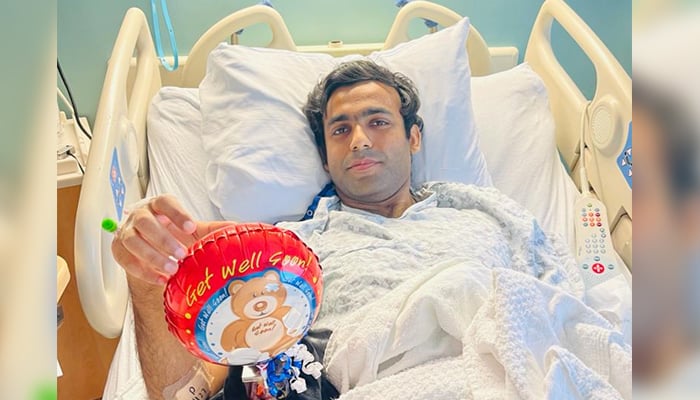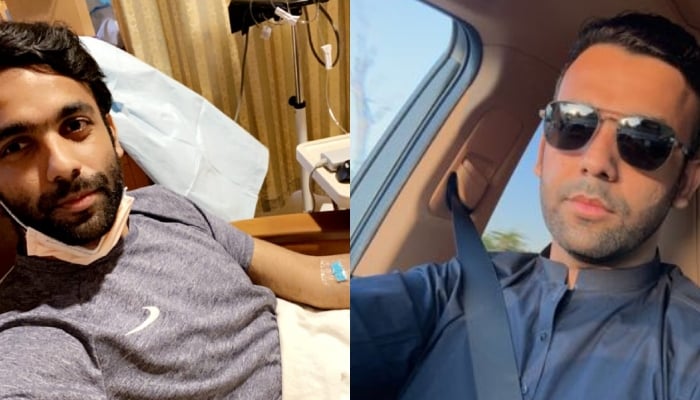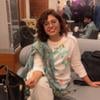Life lesson: How a miracle drug helped Pakistani man defeat cancer
Geo.tv reaches out to young man to explore his journey as a cancer survivor
June 29, 2023

Cancer is one of the leading causes of death worldwide and in Pakistan. The illness impacts the lives of not only patients but also their loved ones.
Not only does cancer wreak havoc in the body and is extremely costly to treat it also scars patients mentally.
Even if the disease is treated, the threat of relapse looms large — often throughout their lives. However, medical advancements have introduced new cures for the disease that give hope to those suffering.
One young man from Pakistan, a third-stage colon cancer patient named Asad Nadeem, has recently undergone a newly-introduced treatment with promising results.
Geo.tv reached out to Nadeem to explore his journey as a cancer survivor.
Q: How has your cancer diagnosis affected you and your family?
Prior to receiving my cancer diagnosis, I had mentally prepared myself for the possibility of such a situation.
However, the news had a significant impact on my family, particularly my mother. As the only son, my illness affected her deeply.
Q: Do you think the whole process has also affected you mentally? How?
Due to the constant support and presence of my parents, as well as my caring paternal uncle and aunt, who were with me throughout the treatment, the entire process did not have a significant mental impact on me.
Q: Please explain the whole journey and how you dealt with it.
Ans: The phase before my cancer diagnosis was extremely challenging. I experienced great physical and mental distress because a renowned hospital in Karachi failed to diagnose my cancer.
This misdiagnosis took a toll on me for six months until I finally received a correct diagnosis. Determined to seek the best treatment, I travelled to New York and sought the expertise of a doctor at Sloan Kettering.
This gave me a sense of security and confidence, knowing I was in capable hands.

Q: What is the most significant change you see in yourself after defeating cancer?
The most significant change I have noticed in myself since living without cancer is a newfound appreciation for life. After being declared cancer-free, I struggled with anxiety and depression for a while. However, this experience taught me the importance of living in the present moment and maintaining a positive outlook. I have learned to cherish each day and not dwell on the uncertainties of the future, as none of us truly knows what tomorrow holds.
Q: How did you find the strength to go through the treatments?
I drew inspiration and strength from my late uncle, Abdul Jabbar Memon, who was also battling melanoma cancer. His resilience during those five years of continuous treatment gave me the determination to endure my own treatments.
Additionally, the doctors at Sloan Kettering were incredibly supportive, and I received great assistance from a family doctor, who provided unwavering support throughout my journey.
Q: What did friends or family members do or say that meant the most to you?
In the midst of my treatment, some individuals chose to step away, but the support I received from my family members made a significant impact, lessening the weight of the situation.
I was fortunate to have incredibly supportive friends in Pakistan, particularly my Cadet college friends, lawyer group friends, and J colleagues.
Their unwavering moral support was an essential source of strength during my battle with cancer. Without their encouragement, facing the hardships that came my way would have been challenging.
Their words and actions meant the world and made a tremendous difference in my journey.
Q. What was the most important thing you learned during this tough phase of life?
During this challenging phase of life, the most significant lesson I've learned is that not everyone around you can be trusted, as their true nature often reveals itself when you face difficulties. Additionally, I've come to understand the importance of maintaining a positive outlook and treating others with kindness.
Q: Did it make you look at life differently?
After becoming cancer-free, my perspective on life has changed significantly. I now approach life with a different set of goals and aspirations. I've realised that what we desire isn't always what we end up receiving.
I believe that a higher power, such as Allah, has a better plan in store for me.
Q: How did you overcome your fears of treatments, side effects, and the possibility of death?
When I was diagnosed with third-stage colon cancer, I had to confront my fears of treatments, side effects, and the possibility of death.
Before beginning treatment, I held a belief that my chances of survival were slim, and even during my flight to New York, I felt like I might be bidding farewell to Karachi forever.
Nevertheless, once the treatment commenced, I participated in a clinical trial that involved a new drug called dostarlimab. Unfortunately, this drug brought about severe side effects, including a painful obstruction in my colon.
A stent was inserted to address the obstruction, but I continued to grapple with significant constipation for nine months leading up to my surgery.
However, it was through the use of dostarlimab that I ultimately managed to conquer my fears and push forward.
Q: How are you living your life differently as a survivor, and why?
As a cancer survivor, I have made significant changes in my life and prioritised my goals accordingly. One of the key adjustments I have made is focusing on furthering my education and pursuing a legal career. To achieve this, I have taken various courses in the United States.
This decision is primarily driven by the fact that I need to undergo follow-up appointments every six months as a cancer survivor.
Q: What would you tell someone who has just been diagnosed with cancer?
Firstly, I would like to express my gratitude to Geo.tv for reaching out to me. I also want to provide support and guidance to those diagnosed with cancer.
It is essential to maintain a positive outlook during this difficult period. If negative emotions become overwhelming, it is advisable to seek solace in a trusted friend or family member.
Moreover, including the recitation or listening to Surah Rehman in your daily routine may have the potential to improve the healing process and expedite recovery.












